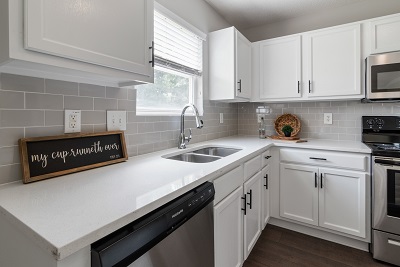
Yes, bidding wars are breaking out in the rental home market. With the rising demand for rental housing, you might be thinking of buying real estate, earning rental income to pay the mortgage, and building a new source of equity. With usually low interest rates available, is it time to strike while the iron is hot?
Here are a few considerations, topped off with some ideas for new investors diving into a very competitive market.
Getting Started
If investing in real estate is new to you, check local your local housing authority or nonprofits for courses on successful investor-ownership. The Small Business Administration (SBA) is also a good place to start. Landlord classes give potential buyers an understanding of the Fair Housing Act and your applicable laws and regulations. They often include key insights about the housing market. They may also provide mentors who can teach you the basics, like the correct way to handle security deposits, how to check potential renters’ income and housing history, and tips for meeting your applicants.
Getting started also means getting financially ready. To get financing for an investment property, assume you’ll have to put 25% down. Different lenders, including credit unions, may have different loan products, and some may be tailored to the first-time investor.
Get ready to pay for appraisals and inspections, too. And the property taxes. Don’t forget homeowner’s insurance — ask about bundling with title insurance and landlord insurance.
Add in the renovations, replacements, and repairs. Even a property in great shape will likely take a few thousand dollars to make move-in ready.
Beyond all that, a lender will want to see an ample financial cushion — a good half-year of loan payments on hand to cover times when a unit is vacant or needs unexpected repairs.
Picking Your Spot
Once your financial ducks are in a row, you can pick a spot with plenty of hopeful renters. Find a good, local real estate agent for invaluable knowledge and professional connections.
Some renter-friendly attributes of a city include:
- Forward-looking city planning (for walkability, public transit, EV charging infrastructure etc.).
- Reasonable property taxes, but a highly rated school district (especially for value when you go to sell).
- Pet-friendly policies.
- A robust job market, especially in tech; or colleges and universities nearby.
- Parks, malls, coffee shops and restaurants, and popular grocery stores, all accessible in a safe environment.
Location is the key to keeping and property occupied. And even in times when you have a vacancy, when surrounding demand is high, you’ll likely be building equity. Current reports show demand for city renting back on the rise.
Condo or House?

Although demand for every kind of housing is strong, we have seen houses go up in value at a higher clip than condos during this housing boom. Yet while there’s stronger appreciation in value for houses, that means condo properties can offer some good deals in this market.
☛ See: With Home Prices Soaring, Condos Are a Relative Bargain. Here’s How Their Deeds Work.
Condos take care of the property management for buyers. Most condo properties handle snow removal, paving, drainage and landscaping, plus roofing and major exterior work. The management and accounting firm will usually have an online portal to accept monthly payments and work orders. Buying a remote property? These advantages can help you manage responsibilities from a distance.
But do your due diligence first. Here’s what we mean by that.
The Diligent Condo Buyer’s Checklist
- Ask the homeowners’ association (HOA) if renting out units is permitted. And will that be the case when you close? A condo HOA can limit the percentage of investment properties, and you won’t want to close after the quota is already filled.
- Check for screening rules. Can the condo board overrule your decisions to accept specific renters?
- Know how much rent is normal for your unit. Check the real estate sites to find out what renters expect to pay, and how quickly the units fly off the shelves, so you can calculate demand and potential income.
- What are the monthly HOA fees? Is waste removal, water, sewer, and gas included? HOA fees can go up yearly or even more often, sometimes outpacing investor income. The board can also change its bylaws in ways that impact value and demand.
- What type(s) of insurance are owners expected to have? A copy of your coverage details will need to be on file at the office.
- Learn whether a special assessment could be coming up. Will the property soon get a new pool company? New roofing? A recertification inspection? Structural improvements? Don’t be caught off guard with a big-ticket item that has to be paid for by the homeowners. Check the budget to be sure there’s an ample reserve fund.
- Found a unit you’d like to buy? Compare other condos’ prices at the same condo property. They’ll depend on a unit’s general condition, view, parking placement, whether the unit is on the end or upstairs, and even points like which buildings are most susceptible to flooding or need their roofs or balconies redone.
- How old are the appliances? It matters. Installing new heating and air conditioning in a condo can cost $7,000 to $9,000.
Some investors steer clear of condos because of the board’s authority to make changes. Consider worst-case possibilities. What if the board limits renting? Are you prepared to sell the unit or move into it? A house (if it’s not part of an association) gives you better control. HOA board members are elected by other owners, and typically need no knowledge of finances or property management.
Pro tip: To get the news and the facts, read the condo association’s recent newsletters and meeting minutes. These will have insights into the board’s recent and current plans, and how well it functions.
Managing Your Rental Business
What return do you expect to have? It can be hard to make money, especially in the first year. If a renter pays $1,400 per month, perhaps the monthly mortgage is $700. Maybe you’ll budget close to $700 in operating expenses for the property. Investors find liability insurance and accountant services important to have. Experienced investors may decide to expand their holdings and hire managers, then count the management costs as business expenses for tax purposes.
Go to your accountant in advance to chart out potential returns, and receive professional guidance on expenses, depreciation, and deductions. Your accountant has knowledge for how to pay initial costs, accept rental payments, and handle later purchases for optimal tax treatment.
☛ Here’s a calculator you can use to estimate your investment returns on a given property.
If you’re buying a house, you’ll be accounting for landscaping, maintenance, and emergency needs. Investors must be ready to deal with storm damage, clogged toilets and sewer pipes, fundamental changes in a renter’s circumstances, and so forth.
Moving an investment property into an LLC? Some investors close on their purchases in their names, then record the property title under the LLC. Investors should consult with local tax and real estate attorneys for guidance.
☛ Thinking of forming an LLC for real estate? Here’s what you should know.
Important note: When moving a property that’s titled in people’s names into an LLC, the mortgage acceleration clause may be triggered; be sure to speak with your loan servicer and title insurer in advance!
Working From Home
If the investor’s down payment is too much of a hurdle, an alternative way to finance your purchase is…to live in it! Buy a property with two to four units — the max before you’d count as a commercial property — and live in one of your units. There’s a trendy name for this strategy: House hacking.
☛ Read more about “House Hacking”: When Your Home Is a Rental Property Too.
Then, you can do as other owner-occupiers do: put down just $20%. With some loans, you can put down less. The Federal Housing Authority (FHA) allows for much lower down payments.
☛ FHA loans come with private mortgage insurance charges. These push the borrower’s monthly mortgage payments higher. Understand private mortgage insurance, or PMI.
Some house hackers stay in the building for at least a year as required, then rent out the unit they lived in.
Timing Is Everything
Maybe you could earn higher and quicker returns through other investments. But if you’re keen on the investor-owner adventure, the comparison isn’t apples-to-apples.
Most property investors, like most homeowners, are looking at returns over the long term, building equity through real estate. Along the way, they can experience the satisfaction of working with people, improving lives and communities. If the challenge inspires you, now could be the time to get started.
Photo credits: Curtis Adams and Charlotte May, via Pexels.
